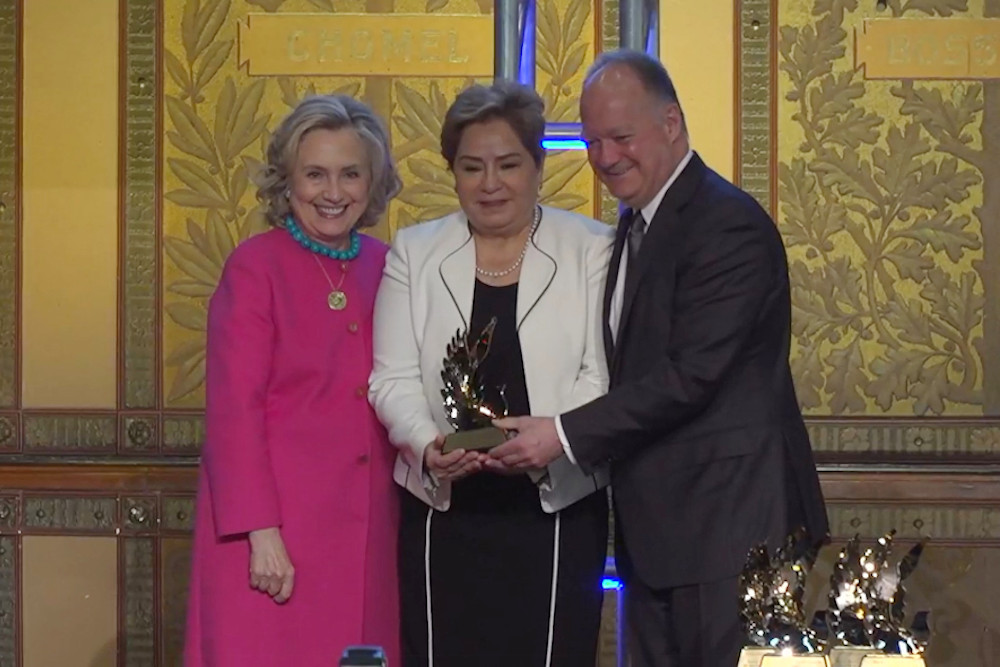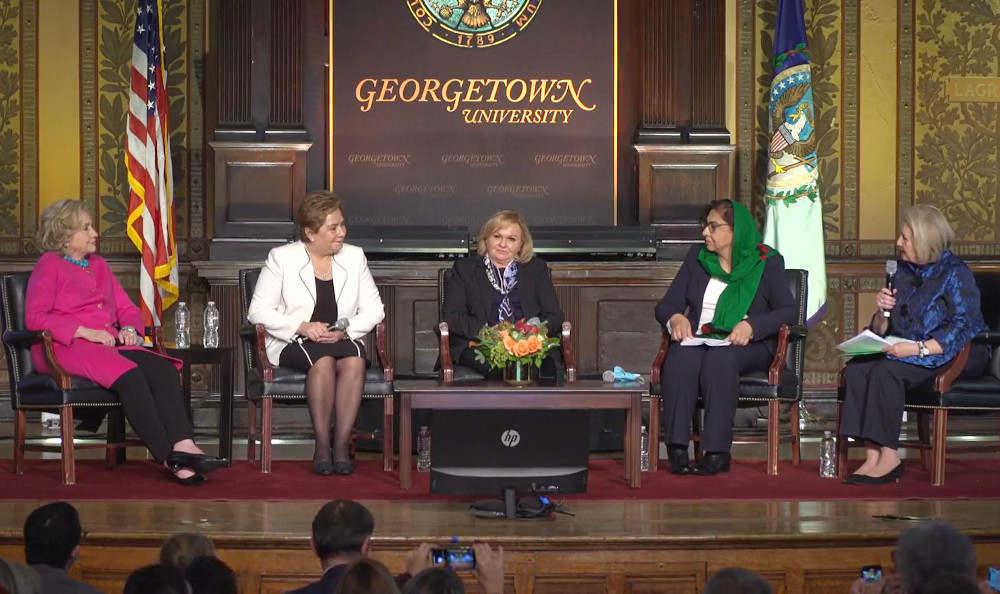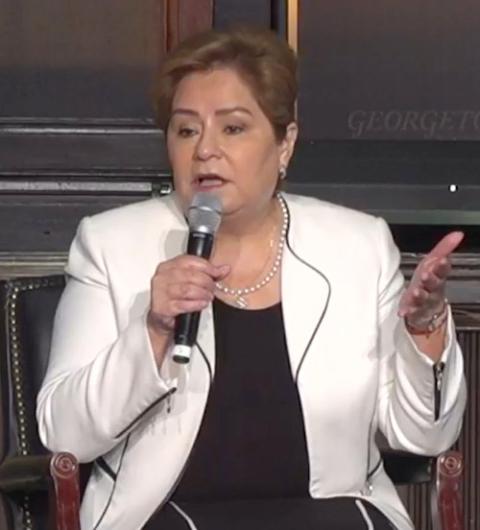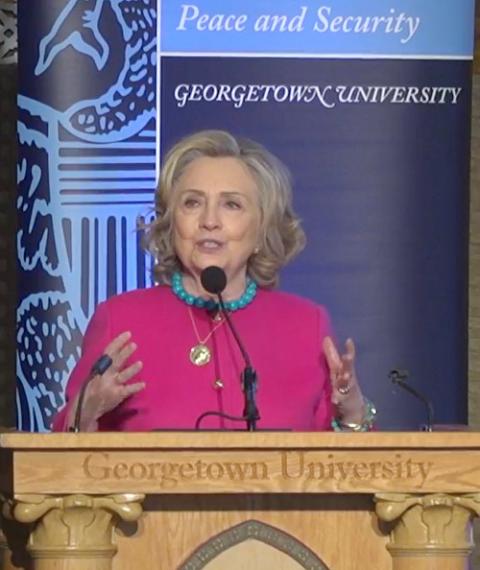
Patricia Espinosa, executive secretary of the United Nations Framework Convention on Climate Change, receives an award from the Georgetown Institute for Women, Peace and Security on Dec. 6. Also pictured are Hillary Clinton and Georgetown president John DeGioia. (NCR screenshot)
Patricia Espinosa, head of the United Nations' top climate change agency, was among five honorees recognized Dec. 6 by Georgetown University and Hillary Clinton for their leadership and work in advancing women's rights around the globe.
Espinosa has "reminded us that climate change or any other challenge of humanity, cannot be addressed if we leave half of the population of the world behind," Melanne Verveer, executive director of the Georgetown Institute for Women, Peace and Security, said at the ceremony.
The institute presented its 2021 Hillary Rodham Clinton Awards to Espinosa, executive secretary of the U.N. Framework Convention on Climate Change, and four other women whose work included expanding legal services for women in China, opposing child marriage in Africa, and advancing freedoms and education for women in Afghanistan.
Advertisement
The awards celebrate "extraordinary women trailblazers" who work to promote and empower the rights, roles, opportunities and protections for women and girls. Clinton, the former U.S. senator, secretary of state, first lady and the first female presidential candidate of a major party ticket when Democrats nominated her in 2016, is the founding chair of the institute, which was established in 2011. Clinton attended and spoke at the midday awards ceremony in Gaston Hall.
Delayed a year by the coronavirus pandemic, this year's event marked the 25th anniversary of the U.N.'s Fourth World Conference on Women, held in Beijing in 1995, which produced an action platform to accelerate the advancement of gender equality across 12 key areas, among them economics, health, ending violence and the environment.
It was at that conference that Clinton delivered her famous speech in which she stated that "human rights are women's rights. And women's rights are human rights."
"The conference itself was a turning point in both the definition and the fight for gender equality," Clinton said in brief remarks. "It brought women from literally every corner of the globe together to insist that human rights are women's rights and women's rights are human rights once and for all."
Besides Espinosa, the honorees were Marina Pisklakova-Parker, who founded the first domestic violence hotline in Russia; Guo Jianmei, founder of the Center for Women's Law Studies and Legal Services in China; Nyaradzayi Gumbonzvanda, who has advocated for gender equality and ending child marriage in Zimbabwe and crisis countries; and Palwasha Hassan, director of the Afghan Women’s Educational Center.
All of the women attended the Beijing conference.

The Georgetown Institute for Women, Peace and Security presented its 2021 Hillary Rodham Clinton Awards to five women for their work in advancing gender equality at a ceremony Dec. 6 in Gaston Hall. Pictured, from left, are Hillary Clinton, Patricia Espinosa, Marina Pisklakova-Parker, Palwasha Hassan and Melanne Verveer. (NCR screenshot)
"In my view, Beijing was a change in human history" and not just regarding women's issues, Espinosa said during the Georgetown event. She said the Beijing conference also changed her personally and professionally, as she sat and listened "to these women coming from so many different parts of the world, and talking about challenges they were facing that I had no idea they existed."
"It was an eye opener," she said.
At the time, Espinosa was a member of Mexico's delegation to the U.N. Before rising to a top position at the U.N., she served as Mexico's ambassador to Germany and Austria. During a seven-year stint as Mexico's secretary of foreign affairs, which began in 2006, she worked with Clinton, her U.S. counterpart, who called her "a dear friend of mine."
"She is someone who can get a job done without seeking or demanding credit or attention, making it possible for a global agenda, whether it's on women's rights and gender equality or climate change, to move forward," Clinton said.

"Climate change is today the biggest threat to humanity— and it affects women disproportionately," Patricia Espinosa, executive secretary of the United Nations Framework Convention on Climate Change, said during a Dec. 6 event hosted by the Georgetown Institute for Women, Peace and Security. (NCR screenshot)
In 2016 Espinosa, 63, became the fifth executive secretary of the UNFCCC, the body that oversees diplomatic efforts to address climate change. She took the helm just months after the adoption of the historic Paris Agreement, in which where nearly 200 countries for the first time committed to holding average global temperature rise to "well below" 2 degrees Celsius and to work to limit it to 1.5 C.
Espinosa had the early task of shepherding the Paris accord from adoption to ratification, which happened in record time for recent international agreements. But despite that early momentum, she has faced numerous challenges in her efforts to keep the agreement on track as the world enters a critical decade for aggressive climate action.
At the start of the latest U.N. climate summit, COP26, in Glasgow, Espinosa said, "We stand at a pivotal point in history" where "humanity faces several stark but clear choices."
"We either choose to achieve rapid and large-scale reductions of emissions to keep the goal of limiting global warming to 1.5 C — or we accept that humanity faces a bleak future on this planet. … It is about much more than environment; it is about peace, stability and the institutions we have built to promote the well-being of all," she said.
Although climate change wasn't on the agenda at the Beijing conference, women's participation in environmental decisions was, said Verveer of the Georgetown institute, who was also the first U.S. ambassador for global women's issues.
"As [Espinosa] pointed out, women are often the key providers of food, water and energy, and at the same time, they bear the brunt of the climate crisis," Verveer said. "They are critical to drafting climate solutions, but are often marginalized from climate leadership, whether at the grassroots regional or national levels."
"Climate change is today the biggest threat to humanity — and it affects women disproportionately."
— Patricia Espinosa
In a short speech, Espinosa said that "climate change is today the biggest threat to humanity — and it affects women disproportionately."
She pointed out that while there were many women among the 30,000 participants at COP26, few were in leadership or decision-making positions. Of the more than 120 heads of state who attended, only a handful were women — a point made clear by a reception photo that went viral.
"To me, it was really striking. It's like the picture of power in the 21st century. That is not acceptable. We need to react," said Espinosa, adding that while there has been progress since the Beijing conference, "we're still very far from ensuring that women have the place that belongs to them in society, in all walks of life and particularly in power."
A report this year by the Georgetown Institute on Women, Peace and Security showed that gender-related inequalities in society make women — who often are in charge of collecting essential resources for their families, although they often lack land ownership and a say in decision-making — more vulnerable to the impacts of climate change and to conflicts that erupt as rising temperatures lead to battles for limited resources.
Espinosa said countries remain "still very far" from fully incorporating women into decisions about solutions to climate change, and called it "an ethical issue" to continue pressing for substantial and urgent action.

Hillary Clinton, honorary founding chair of the Georgetown Institute for Women, Peace and Security. (NCR screenshot)
"We cannot give up, for our own sake, for the sake of our families, for the sake of the whole of society," she said.
Espinosa added that young women — and men — today "have the very rare, rare opportunity to make a dramatic change in history," not only in addressing climate change but in ensuring "a good and healthy life for your generation and generations to come."
"We know that the way that we have been doing things is not sustainable, that we are investing in our own destruction," she said. "And it's very clear, we're not talking about the future of the planet. The planet will be there. It will change, but it will be there. It's about life, and specifically human life in the planet," as well as other species and ecosystems.
In her comments, Clinton said the five honorees "have shown exceptional courage, creativity, strength, wisdom and, of course, leadership. I know the world is a better place because of their efforts."
She added, "Let them be a reminder to us to keep up this fight. … We have a lot at stake. And we need women leaders from every corner of the globe to continue to stand up, to speak out and, yes, to seek power."








